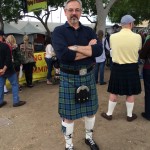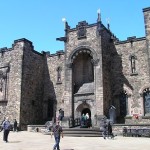For our twenty-fifth anniversary, Cathy and I went to England and Scotland and had a “smashing time.” We stayed in London for a couple of days at either end of our trip, but for the most of it we lit out for the hinterlands to wander along Hadrian’s Wall, explore the Lake District (both in Northern England not far from Scotland’s border, and then to Edinburgh for nearly a week of steeping ourselves in the history and sights of Scotland. It was wonderful.
I think pretty much everyone has a wee bit o’ Scotland in them, particularly when enjoying a nice single malt. In my case it’s reinforced with an ancestral connection. I admit it’s a tenuous link, but there nonetheless; my grandfather several times removed on Mom’s side was one Angus Cowan, late of Scotland. And a bit of research led me to the fact that although the Cowans were apparently of little historical interest, they were related to the Calhouns, who had their own tartan. Perhaps influenced by a little Scotch tasting prior to walking by the store, I decided it would be a great idea to honor my Scottish heritage by buying a kilt in the family (?) tartan.  OK, so for a half-Australian-half-Mayflower-American (with maybe a little Dutch thrown in for good measure) that’s a bit of a stretch, but what the hell. It was a VERY nice Scotch tasting. And truth be told, I had been thinking it would be cool to own a kilt ever since my sister Kathleen developed an interest in Scotland and made me realize what a damn cool little country it is. Not to mention the Angus Cowan connection and all.
OK, so for a half-Australian-half-Mayflower-American (with maybe a little Dutch thrown in for good measure) that’s a bit of a stretch, but what the hell. It was a VERY nice Scotch tasting. And truth be told, I had been thinking it would be cool to own a kilt ever since my sister Kathleen developed an interest in Scotland and made me realize what a damn cool little country it is. Not to mention the Angus Cowan connection and all.
Anyway, I’m a little fuzzy on the chronological sequence, but during that week we also toured the Edinburgh Castle and Holyroodhouse (the residence the British royal family occupies when she’s visiting), and toured the Highlands (actually, a pretty small section of them in southern Scotland), and became enamored with the Scottish history. A good case can be made that The Enlightenment started in Scotland; it’s clear that Scottish philosophers and scholars contributed mightily to it at the very least. It’s also true that much of England’s fighting in the 17th, 18th and 19th centuries was done by Scottish highlanders; even today images of kilt-wearing, bag-pipe playing soldiers marching into cannon fire stirs even the least-patriotic heart. (At least it does if you’ve had a wee dram of two.)
Growing up as a JW doesn’t lend itself to much in the way of martial activities; we didn’t play soldier, join the Boy Scouts or any of that stuff, as being too connected to a militaristic view. While we didn’t consider ourselves pacifists (opposed to all war), we didn’t support (nor did we oppose) our military; we viewed ourselves as separate from it. This in spite of the fact that Dad served as a naval officer during World War II, and was proud enough of it that he specifically wanted it mentioned in his obituary at his death. Interesting dichotomy there, but that’s for another post.
 So anyway, I wasn’t militaristic, and didn’t think of myself of a patriot. So it’s interesting to me that when we were touring the Edinburgh Castle and came to the Scottish National War Memorial, how profoundly it affected me. We had decided to spend the day wandering around the castle (it’s huge, and made up of numerous buildings, battlements, residences and museums); I didn’t even know there was a war memorial until I was in front of it. Originally constructed after the end of WWI to honor the fallen of that war, it now is dedicated to Scots (men, women and even animals) in all the conflicts since then as well. There were friezes of Scotsmen going into battle in World War I, World War II, and even a room dedicated to the animals who supported the troops in war (horses, mules, even dogs and camels). At any rate, as I was wandering through the various rooms of the memorial, looking at the paintings, friezes, statues, battalion flags and the like, suddenly a powerful feeling of connection to the soldiers came over me.
So anyway, I wasn’t militaristic, and didn’t think of myself of a patriot. So it’s interesting to me that when we were touring the Edinburgh Castle and came to the Scottish National War Memorial, how profoundly it affected me. We had decided to spend the day wandering around the castle (it’s huge, and made up of numerous buildings, battlements, residences and museums); I didn’t even know there was a war memorial until I was in front of it. Originally constructed after the end of WWI to honor the fallen of that war, it now is dedicated to Scots (men, women and even animals) in all the conflicts since then as well. There were friezes of Scotsmen going into battle in World War I, World War II, and even a room dedicated to the animals who supported the troops in war (horses, mules, even dogs and camels). At any rate, as I was wandering through the various rooms of the memorial, looking at the paintings, friezes, statues, battalion flags and the like, suddenly a powerful feeling of connection to the soldiers came over me.  I won’t say it was a recollection (obviously I hadn’t been there!) but that’s as close as I can come to describing it. I felt like I understood how they felt; the anticipation of the battle, the connection to their fellow soldiers, even their fear. There was also an almost overwhelming feeling of sadness and loss at the same time. My eyes actually filled with tears and I had to leave. It took me completely by surprise.
I won’t say it was a recollection (obviously I hadn’t been there!) but that’s as close as I can come to describing it. I felt like I understood how they felt; the anticipation of the battle, the connection to their fellow soldiers, even their fear. There was also an almost overwhelming feeling of sadness and loss at the same time. My eyes actually filled with tears and I had to leave. It took me completely by surprise.
Even now I can get back into that moment with very little effort. I really can’t explain it. Maybe it was triggered by my new-found connection to Scotland (being a proud owner of a kilt and all!) But if there is such a thing as reincarnation I would suspect I must have been a soldier in a past life.
